Dessert: Chilled Relations
Continued from Part 4.
“I have never called Chicago a pork-packing town.”
—Ward McAllister
As Opening Day of the 1893 World’s Fair approached, Chicago busied herself with final preparations for hosting millions of guests from around the world. The Exposition would be the biggest party ever thrown, and the names of many dignitaries populated the guest list.
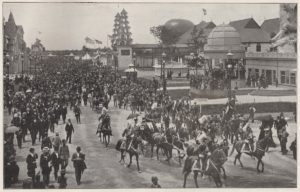
Royalty rolled down the Midway Plaisance when the Princess Eulalia, Infanta of Spain, visited the 1893 World’s Fair in Chicago. [Image from Midway Types: A Book of Illustrated Lessons about the People of the Midway Plaisance, World’s Fair, 1893. Chicago: The American Engraving Company, 1894.]
Entertaining Spanish dignitaries
Throughout April and May 1893, Ward McAllister continued to espouse unsolicited advice on how Chicago should entertain New York society during the Fair. The imminent arrival of two important visitors from Spain would test the hosting skills of both New York (and Mr. McAllister in particular) and Chicago.
The first to arrive on U.S. shores was Cristóbal Colón, the 14th Duke of Veragua and a direct lineal descendant of Christopher Columbus. In the weeks leading up to his April 15th arrival in New York, the Ward McAllister and the Four Hundred fretted over the proper etiquette for hosting this foreign dignitary. A second round of protocol debates ensued when Princess Eulalia, the Infanta of Spain, arrived in New York in late May.
As both of these dignitaries travelled on to Chicago—the Duke arriving for the World’s Fair Opening Ceremony on May 1 and Princess Eulalia spending eight days at the Fair in early June—Ward McAllister never missed an opportunity to pontificate for the press on what Chicago should and should not do. Newspapers lapped up his pot of prescriptions.
McAllister’s tone, though, had softened after the weeks-long kerfuffle with the Chicago press about his first and second interview and because of pushback from within the ranks of the Four Hundred.
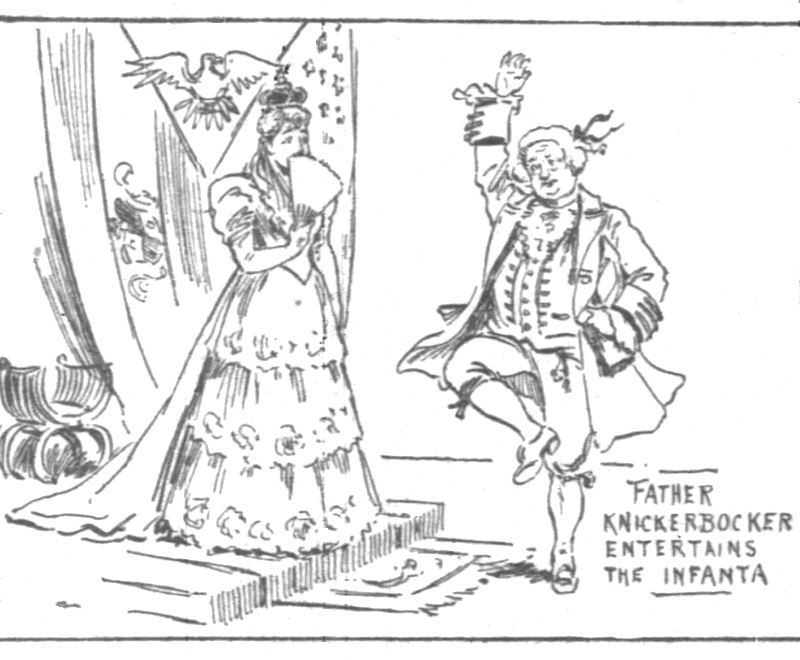
Chicago pokes fun at New York society’s efforts to host Princess Eulalia of Spain in this cartoon labeled “Father Knickerbocker entertains the Infanta.” [Image from the Chicago Tribune May 28, 1893.]
Inflicting dudish twaddle upon the public
“Chicago delighted in such repartee—for the most part,” writes Eric Larson in The Devil in the White City. He adds: “On some level, however, McAllister’s remarks stung. McAllister was one particularly snooty voice, but it was clear to everyone that he spoke with the sanction of New York’s blue bloods.” [Larson 210]
It is not clear that he did, though. Chicago may have been having fun with the spat, but the Four Hundred were not. In fact, at least one important member of New York society stepped in take McAllister’s kettle of boiling sanctimony off the stove.
Just two days after Ward McAllister’s first interview in the April 9th World, New York socialite and author Mary Elizabeth Wilson (M.E.W.) Sherwood spoke to an audience of aristocrats meeting at New York’s ultra-fashionable Waldorf Hotel. Mrs. Sherwood offered an enthusiastic and glowing appraisal of Chicago and the upcoming World’s Fair. Without saying his name, she countered McAllister’s potentially damaging criticism of Chicago’s ability to host Gotham’s high society.
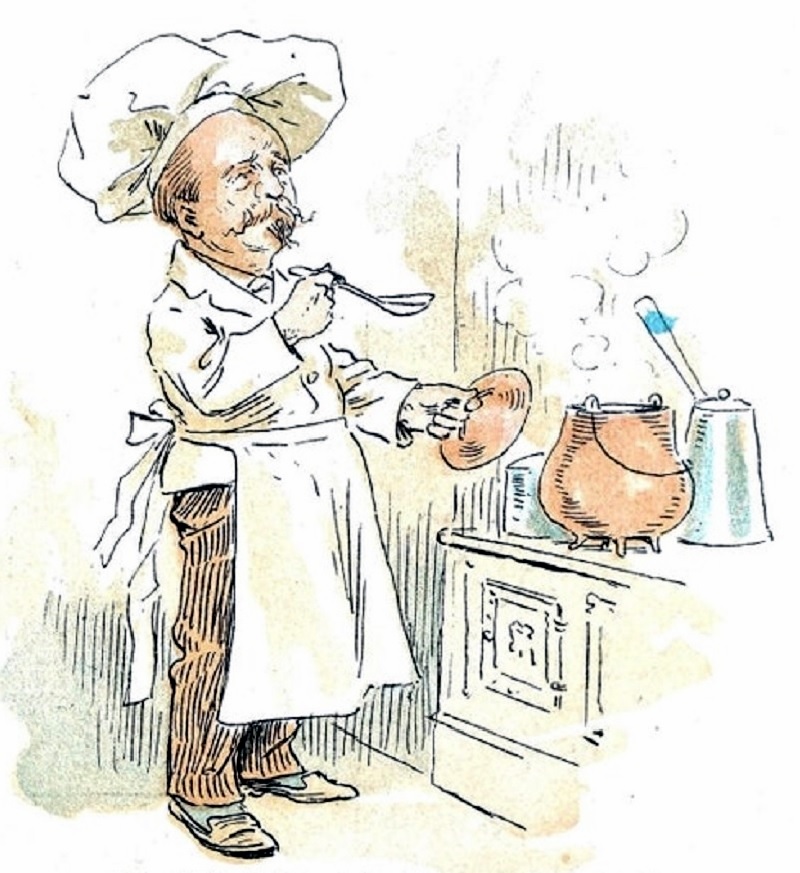
The heated exchange between Ward McAllister and the Chicago press threatened to distract from the opening of the Columbian Exposition. [Image from Puck, Nov. 4, 1891.]
Chicago becomes Mecca of New York’s Four Hundred
The unparalleled magnificence of the opening of the Fair sparked a growing patriotism, equating the success of the Columbian Exposition with success for America, not just Chicago. In early May, McAllister’s attitude suddenly changed. He now was singing praise of the World’s Fair and of her host city. The Chicago Tribune (May 16, 1893) noted that although he “has said and written many foolish things, and not a few times has inflicted the merest dudish twaddle upon the public,” McAllister was now highly complimentary for the Columbian Exposition fairgrounds, architecture, and exhibits. “Evidently,” the paper concludes, “his ideas are not bounded by the narrow circle which embraces terrapin, wine frappés, and the dress ball attended only by members of the Four Hundred.”
Press reports in April 1893 announced that Chicago would become the “Mecca of the 400” during the Exposition. “Society people will flock to Chicago during June and the latter part of September,” announced Mr. McAllister, adding that the New York aristocrats, of course, would arrange their trip to the Chicago Fair before and after summering in Newport, their true priority. [“How to Give a Dance”] Among the New Yorkers he listed as coming to the Columbian Exposition were Mr. and Mrs. John Jacob Astor (who came in late June), Mrs. Stephen Van Rensselaer Cruger, Mrs. I. Townsend Burden, Mr. and Mrs. Willian D. Sloan, and Mr. and Mrs. Bradley Martin. Other the rich and fashionable society members reported to be making plans to stay in Chicago were Cornelius (“the Commodore”) Vanderbilt, William (Willie) Kissam Vanderbilt II, and Oliver Summer Teall. [“Mecca of the 400”]
“Why, I know a man who has been to Europe eight times, but has never been west of the Hudson River,” stated Mr. McAllister “… He is not going to Europe this year—but he is going to the fair instead.” [“New York society leader …”]
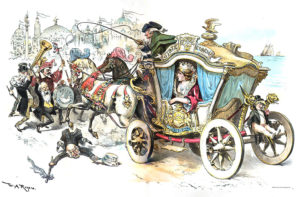
“New York Will Be at the Fair” announces this cartoon, despite the “Mean and Noisy Obstructions” that include a “Daily Detractor” and “Daily Wail of Distress” from some voices in that city. [Image from Puck, Apr. 5, 1893.]
In honor of Gotham’s great ass
Would Ward come west, too?
The Inter Ocean (Apr. 16, 1893) reported that “Ward McAllister will head a small and select Party, the member of which have not all as yet been selected,” and the Chicago Tribune (Apr. 23, 1893) also noted that Mr. McAllister had announced that he will visit the Fair. “One would have thought that a man who hadn’t curiosity and patriotism enough to see his country on the other side of his own river banks couldn’t have been drawn west of Jersey City by a 12-inch steel cable,” commented the Chicago Record about “But the World’s Fair has done it. More the World’s Fair has aroused within him what appears to be evidence of intellect.”
Some voices in the press welcomed the social arbiter to the Exposition. “The inner circle, the fringe, the crust and brink of Chicago society are of one sentiment—that is, to make Mr. McAllister’s welcome a warm one,” announced the Elmira Star-Gazette (Apr. 12, 1893). The New York World (Apr. 16, 1893) cautioned that “it has been intimated that Mr. McAllister feels some hesitation about going on to Chicago because of the deep feeling which has been aroused against him in that town.”
Hyder Ali’s doggerel, published in the Chicago Dispatch (reprinted in the Buffalo Enquirer Apr. 14, 1893), indicated that Ward’s reception in the Windy City might be as chilly as wine frappé:
We are sure that the World’s Fair will be a success.
Ward McAllister’s seal of approval is set
On the style of Chicago’s new bonnet and dress.
And Ward know what is right in that line you bet—
Or thinks he does.
Ward says that he’ll show us how wine to frappe
He’ll bring come decanters here with him and ice.
He don’t like white fish we catch in our bay.
But our venison steaks and our bear’s meat is nice.
Ain’t Ward real nice?
We’ll break all the game laws in order that Ward
May have what he likes when he visits the town.
We will slaughter the bears and with common accord,
The bulls of the wheat pit will see they’re done brown.
And all for Ward.
All we ask of New York when McAllister comes
Is to charter a stock car and furnish a pass.
We’ll receive him in style and a salvo of guns
Will be fired off in honor of Gotham’s great ass.
That’s what we’ll do.
The Washington (DC) Evening Star (Apr. 18, 1893) summed it up this way: “If you want to hear one of those real, old fashioned, dull, sickening thuds, just wait until Ward McAllister goes to Chicago.” Many other pundits thought that New York’s “Social Dictator” should be wary of a Chicago visit.
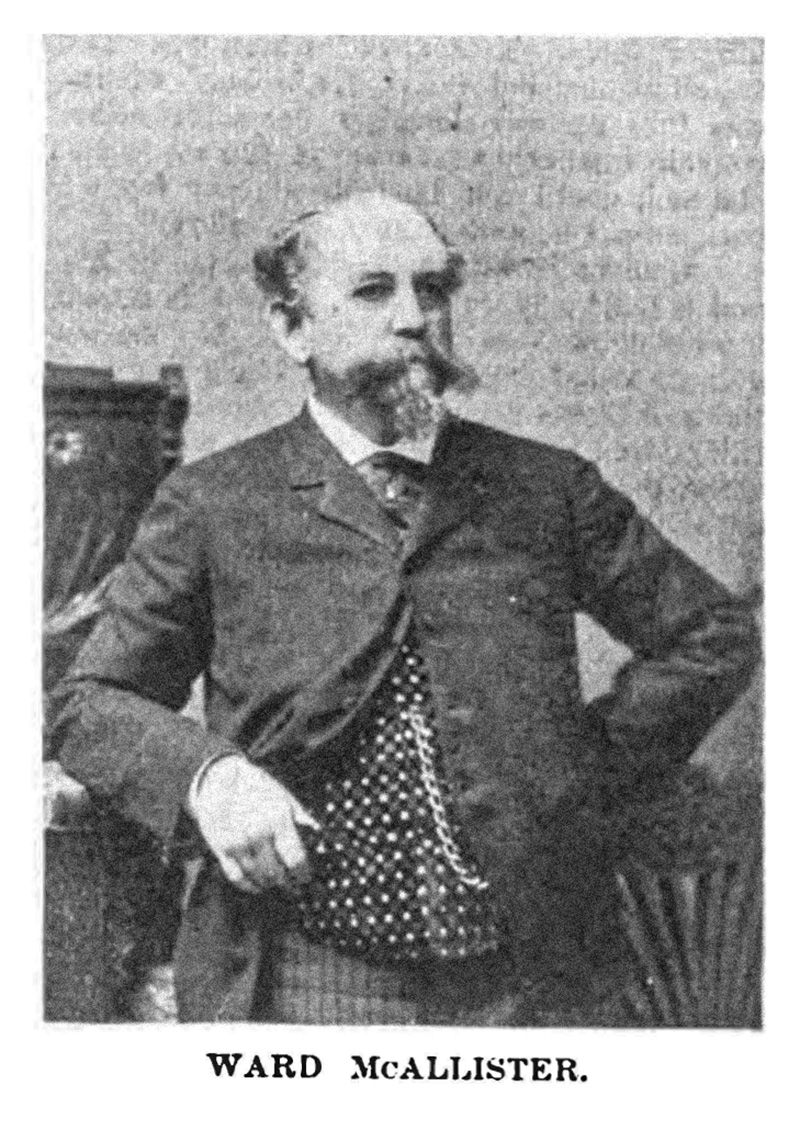
A photograph of Ward McAllister from the December 1893 issue of University Magazine.
McAllister on the Midway
“It will be well for Mr. McAllister if he keeps himself under cover when he goes to Chicago,” advised the Tionesta Forest Republican. “He has the unfortunate habit of putting his foot in it every time he refers to society in other cities. He has made the 400 in New York the laughing stock of the country.” The Indianapolis News shared similar concerns, stating that “Ward McAllister is pretty sure that when Chicago comes in contact with New York society during the Fair, Chicago society will be greatly benefitted. When Ward McAllister comes in contact with Chicago editors during the Fair, Ward McAllister will be overhauled and renovated.”
“Will Mr. Ward McAllister come to Chicago during the World’s Fair?” asked the Chicago Record (Apr. 12, 1893). “We trust so. Not alone for his advice, aid and sympathy, but to perfect and complete the exhibits. There will be many curious things at Jackson park, and there is certainly some quiet niche left in which Mr. McAllister could be seen and admired.”
Quite a few other newspapers shared this idea of putting Ward McAllister on exhibition at the Fair. “The Chicago papers are trying by honied words to induce Ward McAllister to visit Chicago,” wrote the editor of the Salina Daily Republican (Apr. 13, 1893). “Once there the Chicago people will capture him and exhibit him during the World’s Fair.”
“He Should Be Suppressed,” advised the Detroit Free Press (Apr. 16, 1893). “If Chicago has a snobocracy that will indorse Donkey McAllister and his disgusting toadyism, the site of the world’s fair should be changed to some truly American city and McAllister exhibited as a freak.”
“Why do not the managers of the World’s Fair catch that man McAllister and put him on exhibition?” asked an editor of the Decatur Daily Review (Apr. 11, 1893). “This ought to be done before the enterprising fellows who are getting up shows in Midway plaisance get hold of him.”
“Come to the Word’s Fair, by all means, Mr. McAllister, and give Chicago a chance to examine you and to thank God that they are not like you,” offered the Chicago Dispatch (reprinted in the New York World Apr. 16, 1893):
“We can appreciate the pleasure Mr. McAllister must have felt to learn that it would be necessary for him to patronize free-lunch counters, sleep in 10-cent lodging houses and wash in the Chicago River during the World’s Fair. The discovery that the haughty fingerbowl had even invaded the wilds of Chicago must have filled him with delight— frappé delight.”
A cartoon in the humor magazine Puck (May 24, 1893) showed a passenger in a train car asking the porter about a suspicious-looking man in the adjacent seat. The porter reveals that the mysterious man disguised with colored glasses, wig and a flowing beard is Ward McAllister going to see the World’s Fair.
“The West has supplied a broncho race and several bicycle races to the World’s Fair, and has a milch cow race,” observed the Rock Island Argus (Aug. 8, 1893). “Cannot the East enter Ward McAllister and some of his associates for a donkey race?”
Perhaps Ward McAllister heeded these warnings, or perhaps his dance card was full with the summer season in Newport. He appears to have missed the opportunity to attend America’s grand coming out ball in Chicago. The only record of his presence on the fairgrounds is a report about a particularly impolite and bullying creature in the Street of Cairo exhibit on the Midway Plaisance. They named a camel “Ward McAllister.”
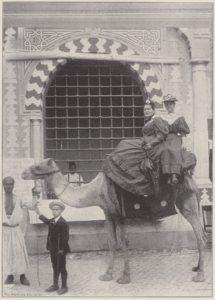
One impolite camel in the Street in Cairo exhibit on the Midway Plaisance reportedly was named “Ward McAllister.” [Image from Midway Types: A Book of Illustrated Lessons about the People of the Midway Plaisance, World’s Fair, 1893. Chicago: The American Engraving Company, 1894.]
The death and legacy of Ward McAllister
“Some time ago Theudas appeared, claiming to be somebody, and about four hundred men rallied to him. He was killed, all his followers were dispersed, and it all came to nothing.”
—Bible, New International Version, Acts 5, verse 36
While the Charity Ball was at its height in Carnegie Hall on the evening of January 31, 1895, the news spread through the assembled blue bloods. Ward McAllister was dead. New York’s social director slipped into death at the age of sixty-eight after a week of illness due to influenza infection and rather poor health for the previous year. He died at home with family by his side. (He did not, as is widely recorded, die alone while dining out.)
In their tributes to him, Chicago newspapers recalled the sting of his comments about their city a few years earlier. “The Chicago papers appear to be just as sore on Ward McAllister now that he is dead as they were when the New York society leader was alive,” commented the editor of the Buffalo Enquirer (Feb. 5, 1895). “We suspect that Ward McAllister is not mourned very much in Chicago.”
Nor in New York, it turned out. Only five Patriarchs and only a handful of the Four Hundred attended his funeral at Grace Church on Broadway. Mrs. Astor’s absence shone brightest. Adding insult to injury, an unruly crowd—many grabbing flowers and attempting to walk away with whole floral bouquets—made national news. Ward McAllister was buried in Green-Wood Cemetery in Brooklyn, and then largely forgotten.
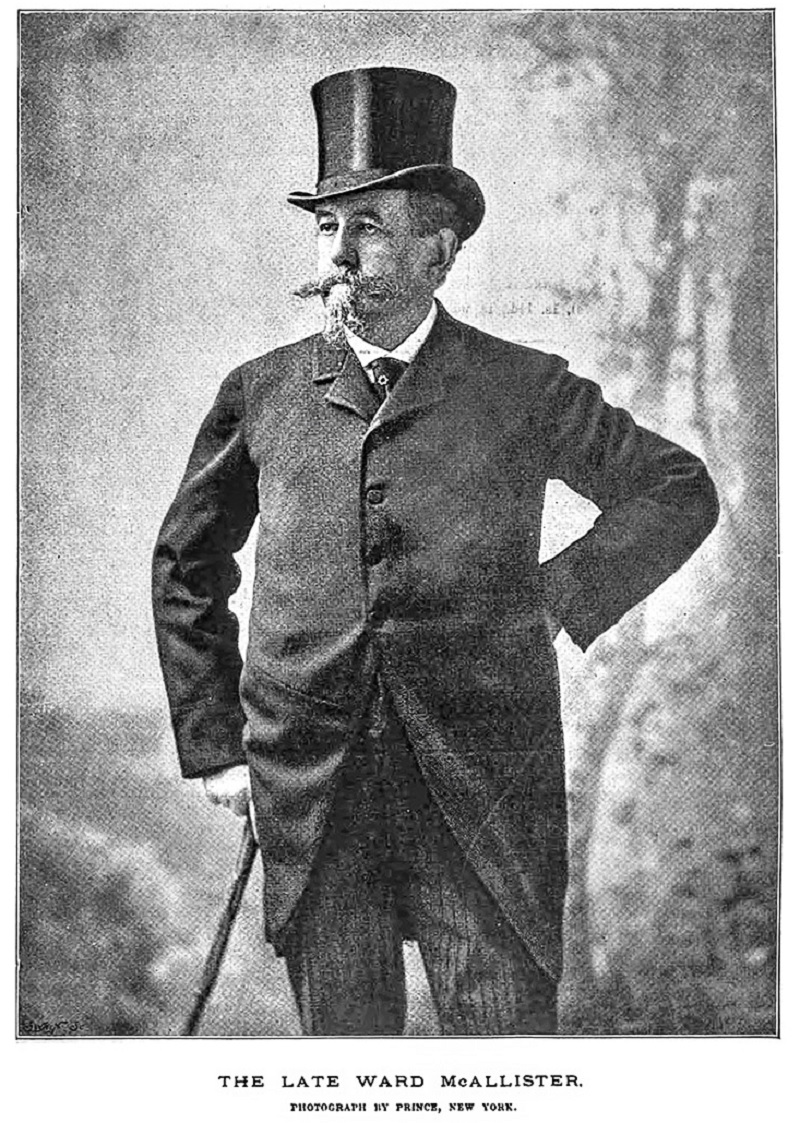
A photograph of Ward McAllister published at the time of his death in 1895. [Image from The Sketch, Feb. 6, 1895.]
Sparking renewed interest in the life and times of Ward McAllister has been his appearance as a character in Julian Fellowes’ The Gilded Age (HBO, 2022), as portrayed by actor Nathan Lane. While Season 1 explores New York society in 1883, we can only hope that coming seasons bring the action to the White City in Chicago.
The fiery rivalry between the Empire City and the Exposition City, sparked by their competition to host the 1893 World’s Fair and fanned by Ward McAllister’s arrogant advice on entertaining, largely cooled by the time the Columbian Exposition closed on October 30, 1893. Occasionally, small embers still can be found.
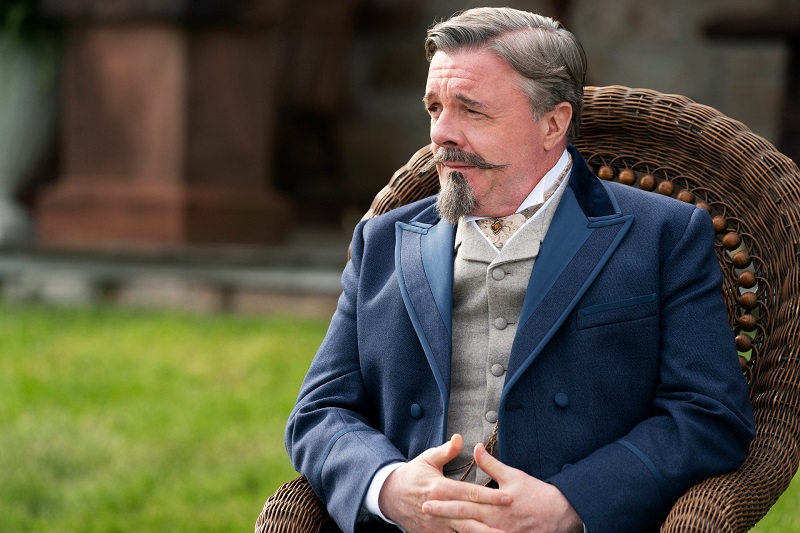
Nathan Lane as Ward McAllister, arbiter of New York society and pontificator of etiquette rules, in HBO’s The Gilded Age. [Photo by Alison Cohen Rosa/HBO Max.]
SOURCES
“As Seen by Mrs. Sherwood” Chicago Evening Journal Apr. 12, 1893, p. 4.
“Chicago Newspaper Comment” New York World Apr. 16, 1893, p. 25.
“The Chicago papers …” Salina (KS) Daily Republican Apr. 13, 1893, p. 2.
“Chicagoans Rage” Elmira (NY) Star-Gazette Apr. 12, 1893, p. 4.
“Fun at the Fair” Chicago Inter Ocean Sept. 3, 1893, p. 21.
“He Should Be Suppressed” Detroit Free Press Apr. 16, 1893, p. 12.
“How to Give a Dance” Chicago Tribune Apr. 23, 1893, pp. 33–34.
“If you want …” Washington (DC) Evening Star Apr. 18, 1893, p. 4.
Larson, Erik The Devil in the White City: Murder, Magic, and Madness at the Fair that Changed America. Crown, 2003.
“Mecca of the 400” Chicago Inter Ocean Apr. 16, 1893, p. 1.
“New York society leader …” Lebanon (PA) Daily News Apr. 7, 1893, p. 2.
“On the Chicago Express” Puck May 24, 1893, p. 219.
“Poor old Ward McAllister …” Tionesta (PA) Forest Republican Apr. 19, 1893, p. 2.
“The Pride of Gotham” Buffalo (NY) Enquirer Apr. 14, 1893, p. 4.
“Social Chat” Buffalo (NY) Enquirer Feb. 5, 1895, p. 4.
“Ward McAllister is pretty sure …” Indianapolis News Apr. 14, 1893, p. 14.
“Ward McAllister Praises the Fair” Chicago Tribune May 16, 1893, p. 4.
“The West has supplied …” Rock Island (IL) Argus Aug. 8, 1893, p. 2.
“What M’Allister Wants” Decatur (IL) Daily Review Apr. 11, 1893, p. 4.
“Will Mr. Ward McAllister Come?” Chicago Record Apr. 12, 1893, p. 4.
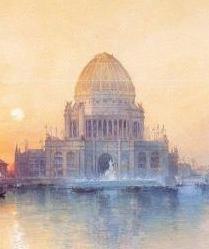
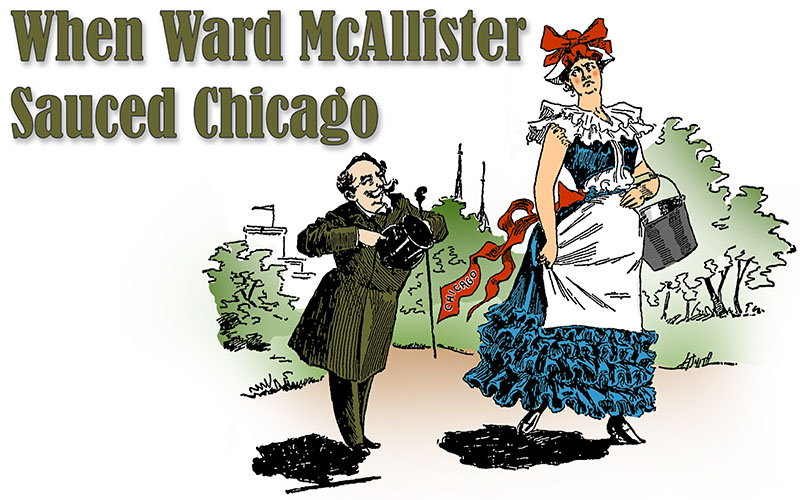
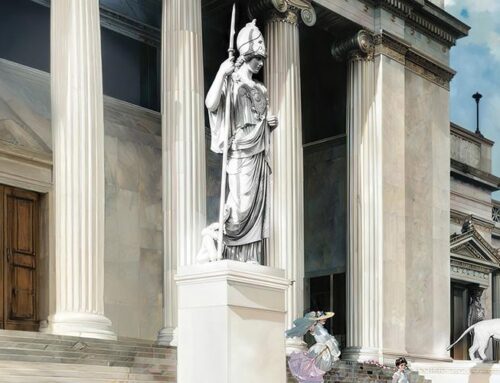
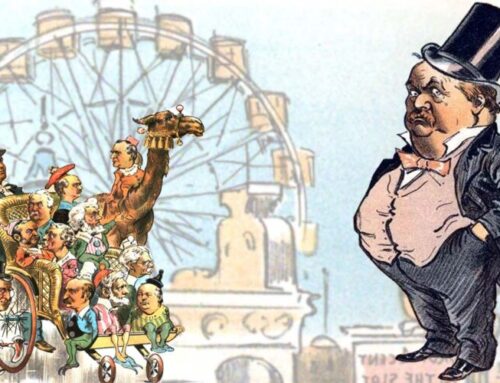
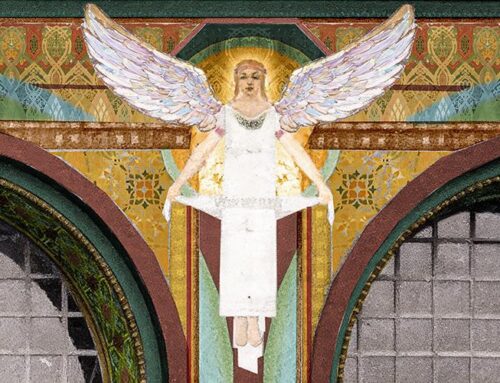
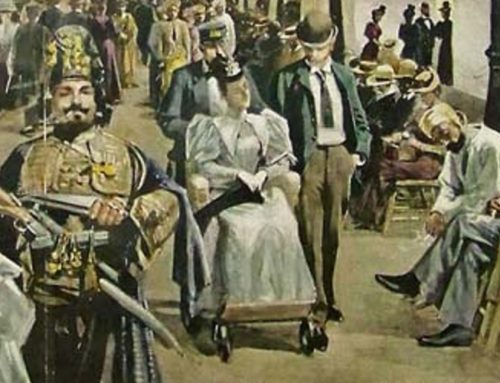

But Chicago IS a pork-packing town!